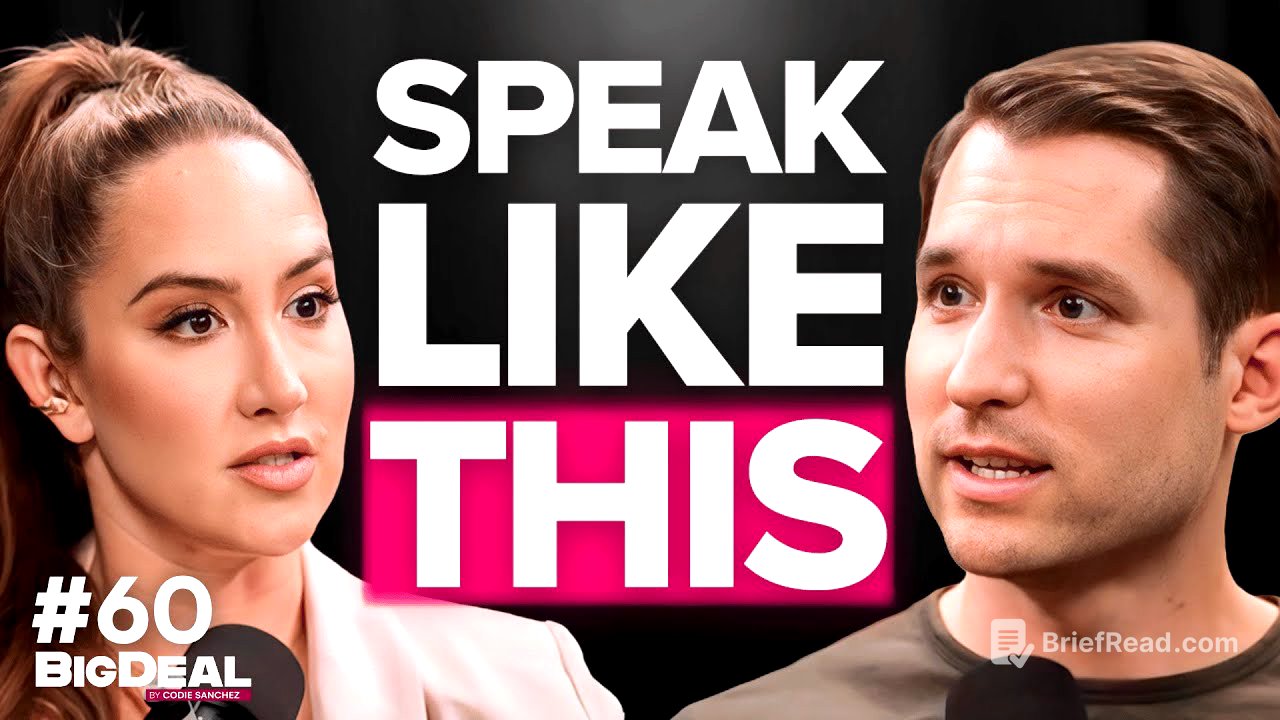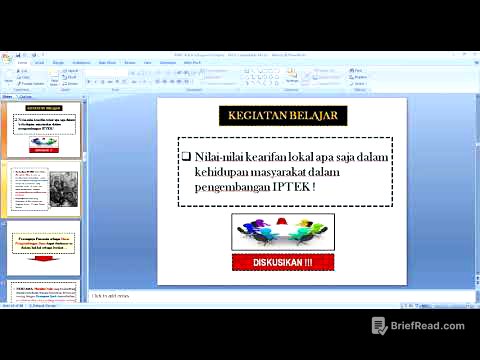TLDR;
This video explores strategies for navigating difficult conversations, handling toxic behavior, and building strong relationships. It emphasizes the importance of communication skills, emotional intelligence, and self-awareness in both personal and professional settings. Key takeaways include understanding different personality types, mastering effective communication techniques, and maintaining authenticity while dealing with challenging individuals and situations.
- Understanding bullying and toxic behavior and how to recognize it.
- Mastering communication techniques for difficult situations.
- Building meaningful relationships through active listening and asking questions.
Understanding Bullying and Toxic Behavior [0:00]
The video begins by addressing the prevalence of bullying and toxic behavior, particularly in professional environments. It highlights that these behaviors often stem from insecurity and a need for control on the part of the perpetrator. The speaker emphasizes the importance of recognizing these behaviors and understanding their underlying causes to effectively address them.
The Art of Communication in Difficult Situations [2:11]
This section focuses on the importance of communication skills in navigating difficult situations. It stresses the need to remain calm and composed, even when confronted with aggression or negativity. The speaker introduces the concept of "calm energy" as a powerful tool for de-escalating conflicts and maintaining control of the conversation.
Knowing When to Stand Up for Yourself [12:28]
The video emphasizes the importance of knowing when to stand up for yourself and assert your boundaries. It advises against immediately reacting emotionally and instead suggests taking a moment to assess the situation and formulate a measured response. The speaker highlights the need to protect one's energy and well-being by not allowing others to constantly drain or disrespect you.
Dealing with Complaints and Negativity [19:11]
This part of the video provides strategies for dealing with complaints and negativity. It suggests acknowledging the other person's feelings without necessarily agreeing with their perspective. The speaker recommends using phrases that validate their emotions while still maintaining your position. It's important to understand the difference between empathy and agreement.
Responding to Bullies and Toxic People [29:09]
The video offers advice on how to respond to bullies and toxic people. It suggests avoiding direct confrontation and instead using humor or deflection to diffuse the situation. The speaker also emphasizes the importance of setting boundaries and not engaging in their negativity.
The High School Dynamics of Adult Life [34:12]
This section draws a parallel between high school social dynamics and adult life, noting that similar patterns of behavior often persist. The speaker points out that understanding these dynamics can help individuals navigate workplace politics and interpersonal relationships more effectively.
Mastering Comebacks and Insults [39:12]
The video explores the art of crafting effective comebacks and insults. It suggests using wit and humor to disarm aggressors and maintain control of the situation. The speaker cautions against resorting to personal attacks and instead recommends focusing on the absurdity of the other person's behavior.
The Art of High-Performance Communication [41:01]
This section delves into the principles of high-performance communication. It emphasizes the importance of clarity, conciseness, and confidence in conveying your message. The speaker suggests practicing your communication skills and seeking feedback to improve your effectiveness.
Calm Energy in Leadership [46:01]
The video highlights the significance of "calm energy" in leadership. It explains that leaders who exude calmness and composure are more likely to inspire trust and confidence in their teams. The speaker suggests cultivating mindfulness and emotional regulation to develop this quality.
Navigating Emotions in Conversations [51:22]
This part of the video focuses on navigating emotions in conversations. It advises acknowledging and validating your own emotions, as well as those of others. The speaker suggests using "I" statements to express your feelings without blaming or accusing the other person.
Understanding Narcissism and Communication [56:30]
The video discusses the challenges of communicating with narcissistic individuals. It explains that narcissists often lack empathy and have a strong need for admiration. The speaker suggests setting clear boundaries and avoiding engaging in power struggles with them.
Crying in the Workplace: A Natural Response [1:01:55]
This section addresses the topic of crying in the workplace. It normalizes crying as a natural emotional response and suggests that it's okay to show vulnerability in certain situations. The speaker advises excusing yourself to regain composure if needed, but not to feel ashamed or embarrassed.
The Balance of Likability and Competence [1:09:08]
The video explores the balance between likability and competence. It suggests that while it's important to be likable, it's equally important to demonstrate competence and expertise. The speaker advises focusing on building genuine connections with others while also showcasing your skills and accomplishments.
The Power of Authenticity in Communication [1:10:43]
This part of the video emphasizes the power of authenticity in communication. It suggests being genuine and true to yourself in your interactions with others. The speaker advises against trying to be someone you're not and instead focusing on expressing your true thoughts and feelings.
The Art of Listening [1:15:03]
The video delves into the art of listening. It explains that active listening involves paying attention not only to the words being spoken but also to the speaker's body language and tone of voice. The speaker suggests practicing empathy and trying to understand the other person's perspective.
The Importance of Asking Questions [1:19:08]
This section highlights the importance of asking questions. It suggests using questions to clarify understanding, gather information, and engage the other person in conversation. The speaker advises asking open-ended questions that encourage thoughtful responses.
Navigating Difficult Conversations [1:24:41]
The video provides further strategies for navigating difficult conversations. It suggests preparing in advance, setting clear goals, and remaining flexible. The speaker advises focusing on finding common ground and working towards a mutually beneficial solution.
Building Meaningful Relationships [1:31:18]
This part of the video focuses on building meaningful relationships. It emphasizes the importance of trust, respect, and empathy. The speaker suggests investing time and effort in nurturing your relationships and being there for others when they need you.
Final Thoughts and Reflections [1:34:58]
In the final section, the speaker summarizes the key takeaways from the video and encourages viewers to apply these principles in their own lives. The video concludes with a reminder that effective communication and strong relationships are essential for personal and professional success.









